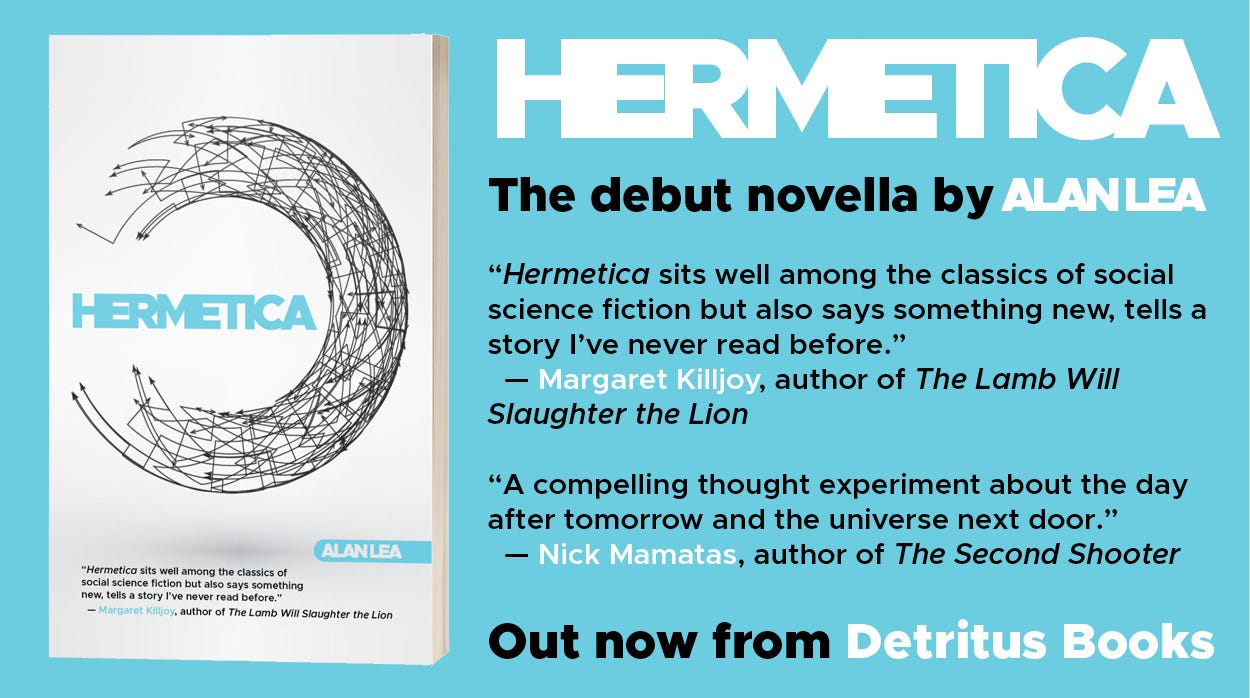We need to connect
Reading, Listening, Teasers
On a trip to Pittsburgh this weekend, Raechel and I listened to Dean Spade and Conner Habib have a great conversation about love, joy, and the messiness of connecting in such a damaged, alienated world.
Dean has a new book out, Love in a F*cked Up World: How to Build Relationships, Hook Up, and Raise Hell Together. I would love for radicals who never read about love or pleasure or boundaries to read this book. Anarchists know in theory that the enclosure and alienation of relationships is a indispensable foundation for capitalism to exist. And as much as NGOs and progressives want to corrupt and co-opt mutual aid, and turn it into a newer, hipper name for charity, mutual aid is a relationship. It’s not something an organization gives to the needy. (Dean also has a good book about mutual aid. And I recommend the original, by Kropotkin, which discusses how mutual aid is a key, existential dynamic of communities, species, and ecosystems.)
In other words, a basis of anarchism is the radical transformation of relationships. But relationships are always complicated, they never obey dogma, and especially in a society like ours, they tend to be messy.
I find that the anarchists I respect the most center relationships and approach them with patience, nuance, attention, and care. Many of the radicals with the most scene status or the biggest platforms, though, either take relationships for granted, subordinate them to reductionist dogmas, or, in a few cases I’ve seen, even manipulate and exploit them for personal power.
I’m really grateful to The Big Idea in Pittsburgh and all the people who came out for the talk. The focus was on building complementary groups where we treat criticism like a gift and find ways to validate and sync up the skills and experiences we each bring to the table. (This is one of the main themes of Organization, Continuity, Community.) People had a lot to share, really intelligent analyses, questions, and definitions. There was one young person, maybe ten years old, who offered really brilliant framings and a couple perspectives I’d missed, and plenty of folks in their twenties, thirties, and forties, though no one who had personally experienced struggles from any further back than the very end of the 20th century. Which isn’t that long ago.
Teasers
I said that I would publish the rest of my research/analysis companion piece at the end of last week. I didn’t! Life is rough, R and I each have frequent doctor’s appointments, usually not the easy kind, I’m applying for jobs and putting up with a lot of bureaucracy to get unemployment and not lose healthcare, and still finding the time to write, teach a course at the local social center, and participate in other movement activities. On that note, this newsletter will always be free, you don’t have to pay for access. But if you want to pay for a subscription as a way to send me a little donation, especially if you come from a well off family or you currently have a stable or high-paying job, I would appreciate it immensely!
I’ve noticed it’s nearly always people who are from working class or even really poor backgrounds who are the most generous. I appreciate you so much! And I also appreciate the folks out there who are the exception to the rule. All of us have a lot of work to do to understand how we’ve been socialized, identify the tools and resources that can be repurposed, and identify the behaviors that only have us reproducing this wretched society.
Anyway, my first teaser is that very soon, I will publish one or even two more newsletters that provide a lot of backing, explanation, and additional sources to the revolutionary responses to the ecological crisis that I describe here, in this recent article I published with In These Times. “Betrayed by Green Capitalism, Here’s How We Can Build a Livable Future.”
The Facts that Back an Ecological Revolution
Today’s newsletter is a companion piece to my new article with In These Times, “Betrayed by Green Capitalism, Here’s How We Can Build a Livable Future.” It’s here for anyone who wants to dig into the data, check my sources, learn more, or understand how fraudulent the official climate framework really is (that’s the framework centered around the Paris A…
In the next month or two, I hope to publish several essays I have half finished: one on the romanticizing of trauma in movies and how showing expressions of pain (especially as a new feature of masculinity) can just be another strategy to avoid repairing it; and another, briefer missive on ability and disability.
Before both of those, I want to finally release a post-election essay on how to interpret the ascendance of the far Right and how to continue surviving it.
Since that’s a question on everybody’s minds, I’ve written up a sort of intro with some questions that might be useful to contemplate over the next week or two.
There’s a lot of fear since Trump won the election. Much of it makes sense, as he’s doing his best to harm immigrants and trans people, and moving the goal posts even farther in explicitly advocating and normalizing Israel’s genocide of Palestinians. The fear makes sense, all of it is a direct response to real, ongoing harm. Maybe it’s just the circles I’m in, but it feels like in Ohio there’s a little less panic (i.e. the counterproductive kind of fear), probably because most of those policies were already happening, often at the same level of intensity.
Ignoring their complicity in the harms we’re currently facing—always a classy move—the Democrats have turned back to the grassroots in a big way, hoping people will once again forgive and forget their unique combination of stupidity, hypocrisy, treacherousness, and racist brutality… and many people are obliging them.
I want y’all to ask yourselves, and encourage everyone around you to ask, every time you come across a criticism of the Trump administration: what is being mourned or rejected here? Is it Trump’s destruction of due process and balanced government – eroding the health of the State; is it obstructing the free flow of capital and commodities – potentially hurting business; or is it directly going after and harming marginalized people? Because the center-left, the Democrats, are talking overwhelmingly about damage to the political and economic order, the one that—remember—is already putting the survival of all life on the planet at risk. Progressives, meanwhile, are talking about all three, mixing them up, conflating harm to the institutions of power with harm to actual people. If we’re unaware of it—and when people are panicking it’s harder for them to distinguish dangers and come up with strategic responses to keep themselves safe—this is an effective way to convince us to support authoritarian, legalistic, or capitalist methods and institutions that have a proven track record of betraying us, destroying our movements, and increasing harm.
Another question to chew on: what were the results of past predictions, in 2016 and 2020, that Trump was imposing a fascist regime or launching a coup? What does this catch-all use of the term “fascism” do to our sense of history, given the forms of genocide and enslavement that have been far more common and sustained under democratic governments than under dictatorships? And if we just redefine every single government in history that has carried out genocide or some form of oppression as “fascism” and insist that democracy is always-already a good thing, what does that do to our ability to distinguish and analyze different strategies the powerful use to win obedience and complicity from the populations they rule?
How does extreme fear specifically tied to the Right enable the Left (or center-left) to get away with equal or similar levels of mass murder and oppression? How does the idea of left unity block paths towards revolution just as effectively as far Right dictatorship? Does anyone know the origins of the strategy of antifascist unity or the “common front,” what it’s actual purpose was, and how it turned out? (Hint, it was in the 1930s, and it was started by the Communist Party after their strategy of collaborating with the Nazis to crush the socialists, social-democrats, and anarchists failed.)
And what does it mean when currents or figures in the movement make imminent predictions about coups and military takeovers that are proven incorrect, but then never own up to those mistakes, never correct their analysis, just wait 4 years to make the same call all over again? I think this last question is especially important because unlike in 2016 and 2020, this time Trump’s team actually has a chance at achieving the softest, most tenuous kind of coup, an “administrative coup,” imposing total bureaucratic loyalty and centralizing the government around the executive branch. This time they actually have a plan and some organizational capacity to do so, which they did not in any way in 2016 or 2020. (It’s important to mention that today they still lack support in the upper echelons of the military, the CIA, and the FBI. And, the last Democratic presidents have also increased the power of the executive.)
I’ve got a couple short stories out there in the world, hoping to find publication in fantasy or sci-fi magazines! The truth is I’ve been writing fiction far longer than nonfiction, though I’ve gotten much less of it published.
I’ve actually had a completed fantasy manuscript (the first of five) for something like seven years now, but curiously, no publishers these days want to publish a thousand page novel by an unknown writer. My second novel, sci-fi and considerably shorter, is still making the submission rounds. So Hermetica, my first published work of speculative fiction, is actually my third novel. Let me know if you have contacts at any bookstores that would like to host a reading… or if you have friends who work at a publishing company that does speculative fiction! Or, or, if you liked it and wanted to give it a good rating on goodreads, or ask your local library and bookstore to stock it, that would be just lovely!!!
Okay Peter, calm down…
So the Superbowl was this past Sunday. The performances and commercials included so many liberal and progressive celebrities draped in American flags, shilling for AI, for cars, for the military, for American unity, in a way that erases the situation of trans people, immigrants, Palestinians, Black people, and so many others. The overwhelming message, was a call for unity that erases any mention of what sort of things might divide us. It’s a call for peace, acceptance, and friendship, when the Right—whether in the US or Israel—is taking concrete action towards the annihilation of their enemies.
The Right has always advocated the liquidation of the enemies of the State, whereas the Left has prioritized convincing marginalized and oppressed groups to join and renew the State. But the Right has accelerated. They no longer define their enemies as those who disagree with them. Increasingly, anyone who doesn’t support them enthusiastically enough is being treated as a potential enemy.
Incidentally, I am really interested in critical readings of the attempts at critical truth-speaking in the halftime performance by Kendrick Lamar, SZA, and Samuel L. Jackson. Link to any good interpretations you’ve found. The only chatter I’ve seen must have had the performance on mute or didn’t understand any of Lamar’s lyrics, because their takeaway was how we shouldn’t let fascists claim the American flag and Lamar was being really subversive by building an American flag out of a Black dance troupe.
Here’s an article by Vicky Osterweil, describing a little party where the most powerful idiots in the world right now are having a great time. “There Is a Room in DC…”
A reminder that the date for the remembrance of Omar Aziz is on February 16, just around the corner! There’s an international call-out for events and activities in support of Syrian anarchists and the continuation of the Syrian revolution!
There’s a webinar about it on the 15th: https://www.blackrosefed.org/aziz-legacy-syria/
And check out the articles from Fifth Estate, Libcom, and the February 16 website, all linked above.
Support this fundraising campaign for an amazing new documentary, A Red Road to the West Bank. This film follows Kanien’kehá:ka filmmaker Clifton Ariwakehte Nicholas as he travels to Palestine, witnessing firsthand the deep parallels between Indigenous struggles in Kanehsatà:ke and the West Bank.
Here are some links you can check out and share:
Mastodon: https://kolektiva.social/@AmplifierFilms/113928914325532459
PeerTube: https://kolektiva.media/w/jfgC46zAZXm83fS7jnisJh
YouTube:
Instagram:
Facebook: https://www.facebook.com/share/v/14v1uMGVff/
Downloadable trailer for IG/FB Reels: https://we.tl/t-o7s6XkR5yv?trk=TRN_TDL_05
For the zinesters, the distros, and anyone who likes passing on helpful resources: a friend shared these two zines about DIY hormones for gender nonconforming folks
https://littlemouse.fun/zines/transfem.pdf
https://littlemouse.fun/zines/transmasc.pdf
Spread! Use! Transform! Nourish yourself! No one can stop you!
Finally, the situation is really grim for anarchists in Sudan (and those who have been forced to flee Sudan). In the midst of a civil war in which liberated, self-organizing spaces had opened up, they’re now being hunted down by multiple sides. I’m looking for articles or fundraisers that can be publicly shared, and I’ll post them in the comments and on my bluesky when I do.
Until next time, take care of yourselves, and take care of one another,
p









While i love Dean Spade's writing in general, i deeply distrust the approach he promotes in his books when it comes to conflict, in my opinion a central question. I agree with you on the crucial role that relationships play in our political praxis, and also with the point you make that they are sometimes messy, raw. The conflict averse and individualizing approach Spade promotes does not sound like a valid solution that works for everyone. I think Starhawk has done much better work on this topic. Her approach invites conflict, as a given, bound to happen, and instead offers tools for how to deal with them in constructive ways when they do occur (impact vs. intention, mediation, rage circles etc). Whereas Spade by and large seems to suggest to always find fault within oneself. Of course, critical self-reflection is always central, but if we sanitize our conflicts too much, we also miss out on a chance to go much deeper in our relationships. The risk and conflict adverse attitude that often reigns in our circles is a huge problem.
Heaps of gratitude for your words, analysis, keeping it real, and being courageous + resilient amidst it all. Big love.